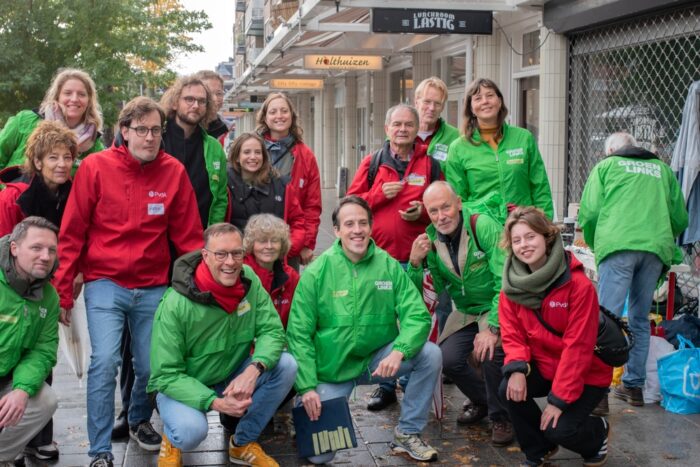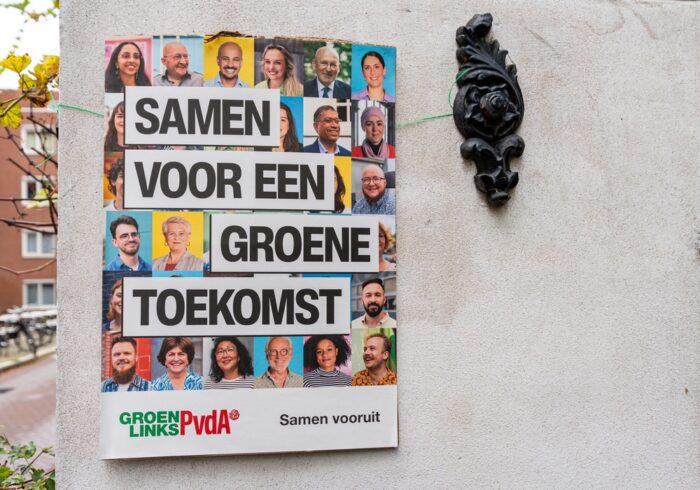Find all related Progressive Post
Progressive Post
Amid Bulgaria’s turbulent political landscape marked by nine elections in just three years, voters oscillate between a desire for stability and a drift towards radicalism. The rise of fringe parties, like the ultra-nationalist Greatness party, underscores the deepening crisis and foreshadows uncertain and volatile times ahead.
Bulgarian voters have just been to the polling stations for the ninth time in three and a half years, breaking several records. Six snap parliamentary elections, presidential, local and European elections have been organised since April 2021. There are several characteristics of Bulgaria’s home-grown political crisis: 1) turbo electoral political dynamics: for instance, Bulgarians elected There is Such a Nation (the right-wing populist party of former TV host Slavi Trifonov) as winner in July 2021, only to kick them out of parliament again in the October 2022 elections; or have searched for new saviours – supporting We Continue the Change (centre, liberal) as winners in November 2021, only to rescind this support by 60 per cent in June 2024; 2) fatigue and alienation – voting turnout in Bulgaria hit a record-low in 35 years with just 32 per cent (less than 2 million) going to the polling stations this time around; and 3) an abnormally long time for the design of the Bulgarian constitution, with president Roumen Radev’s caretaker governments ruling for only about half of the time during 2021-2024.
The political crisis began in 2021 with mass anti-corruption protests against the third government of Boyko Borissov’s GERB (centre-right). Voters’ expectations at that time were that a new political player would change the status quo and remove Borissov’s strong grasp on the country’s judicial system, regulators and economy. A short-lived four-party traffic-light coalition (with representatives of the right, centre and left) embarked on this path, but was not given enough time to govern. A couple of months later another snap election was organised. The Russia-Ukraine war changed the narrative and foreign partners’ expectations for a pro-Western government in the country increased, enabling a coalition government of GERB and We Continue the Change – Democratic Bulgaria (liberal, right). The government relied on the parliamentary support of the Movement for Rights and Freedoms (a Turkish minority party) to make constitutional amendments in the judiciary, partnering with Delyan Peevski (a former media mogul, sanctioned by the US Magnitsky Act for corruption) who became co-leader of the party. Although the government was to be formed on a rotating basis after nine months, the partners could not agree on the anti-corruption reforms and appointments to regulatory bodies, thus triggering the next episode of deepening political crisis with European and snap national parliamentary elections in June.
The results of the 9 June elections have only reaffirmed the social by-products of the deep political crisis that Bulgaria is experiencing. It is interesting to observe that Bulgarian voters are trying to put together two contradictory aims. On the one hand, as a result of their awareness of the multilayered crisis (Covid-19, war, inflation) they are trying to stabilise the political system, bringing it back to a more familiar, more secure state. On the other hand, the way they approach this is by giving support to radical political forces. The surprise of these last elections is the rise of the Greatness party – a relatively new political party that is backed by two conservative, pro-Russian social media stars (one a former secret service agent and the other a speculative entrepreneur in the cultural sector). They managed to pass the parliamentary barrier by spreading conspiracy theories and organising para-military groups. Although their score was low at these elections, their result passed the threshold of 4 per cent giving them access to the parliament. This rather unexpected success is a marker of the monsters to which the political crisis in Bulgaria is giving birth.
The perspective of forming a stable government is very obscure, expanding the risk of another snap election. Although emerging first in these June elections, Borissov’s GERB is calculating electoral losses. He is now faced with forming a coalition with the Turkish minority political party Peevski, the latter being a synonym for corruption among the broader public. Nevertheless, they will need to find some other smaller partner to have a majority. The liberal-right coalition lost a third of its voters, mainly because of the collaboration with GERB and therefore the more logical strategy for them will be to stay in opposition, but negotiations are not excluded. The Bulgarian Socialist Party (BSP), one of the oldest left parties in Europe with 135 years of history, received another devastating electoral result with around 7 per cent support. The leader Korneliya Ninova set a course of ‘conservative socialism’ trying to compete on the radical spiral, but that strategy is far from achieving success, quite the contrary. It is not difficult to imagine a future where the BSP will be struggling to enter parliament. Numerous other small left-wing political formations competed in the elections (Solidar Bulgaria of the former ombudsperson Maya Manlova, and runner-up for Sofia mayor former syndicalist Vanya Grigorva) but their result is insignificant, despite the popularity of both women among the left. The only strategy for the left to start building electoral support is to seek a broad coalition of the many players in the spectrum, including not only political parties, but also grass-roots organisations, social movements, syndicates, etc.
Photo Credits: Shutterstock.com/RosenIvanovIlliev
| Cookie | Duration | Description |
|---|---|---|
| cookielawinfo-checkbox-advertisement | 1 year | Set by the GDPR Cookie Consent plugin, this cookie is used to record the user consent for the cookies in the "Advertisement" category . |
| cookielawinfo-checkbox-analytics | 11 months | This cookie is set by GDPR Cookie Consent plugin. The cookie is used to store the user consent for the cookies in the category "Analytics". |
| cookielawinfo-checkbox-functional | 11 months | The cookie is set by GDPR cookie consent to record the user consent for the cookies in the category "Functional". |
| cookielawinfo-checkbox-necessary | 11 months | This cookie is set by GDPR Cookie Consent plugin. The cookies is used to store the user consent for the cookies in the category "Necessary". |
| cookielawinfo-checkbox-others | 11 months | This cookie is set by GDPR Cookie Consent plugin. The cookie is used to store the user consent for the cookies in the category "Other. |
| cookielawinfo-checkbox-performance | 11 months | This cookie is set by GDPR Cookie Consent plugin. The cookie is used to store the user consent for the cookies in the category "Performance". |
| csrftoken | past | This cookie is associated with Django web development platform for python. Used to help protect the website against Cross-Site Request Forgery attacks |
| JSESSIONID | session | The JSESSIONID cookie is used by New Relic to store a session identifier so that New Relic can monitor session counts for an application. |
| viewed_cookie_policy | 11 months | The cookie is set by the GDPR Cookie Consent plugin and is used to store whether or not user has consented to the use of cookies. It does not store any personal data. |
| Cookie | Duration | Description |
|---|---|---|
| __cf_bm | 30 minutes | This cookie, set by Cloudflare, is used to support Cloudflare Bot Management. |
| S | 1 hour | Used by Yahoo to provide ads, content or analytics. |
| sp_landing | 1 day | The sp_landing is set by Spotify to implement audio content from Spotify on the website and also registers information on user interaction related to the audio content. |
| sp_t | 1 year | The sp_t cookie is set by Spotify to implement audio content from Spotify on the website and also registers information on user interaction related to the audio content. |
| Cookie | Duration | Description |
|---|---|---|
| CONSENT | 2 years | YouTube sets this cookie via embedded youtube-videos and registers anonymous statistical data. |
| iutk | session | This cookie is used by Issuu analytic system to gather information regarding visitor activity on Issuu products. |
| s_vi | 2 years | An Adobe Analytics cookie that uses a unique visitor ID time/date stamp to identify a unique vistor to the website. |
| Cookie | Duration | Description |
|---|---|---|
| NID | 6 months | NID cookie, set by Google, is used for advertising purposes; to limit the number of times the user sees an ad, to mute unwanted ads, and to measure the effectiveness of ads. |
| VISITOR_INFO1_LIVE | 5 months 27 days | A cookie set by YouTube to measure bandwidth that determines whether the user gets the new or old player interface. |
| YSC | session | YSC cookie is set by Youtube and is used to track the views of embedded videos on Youtube pages. |
| yt-remote-connected-devices | never | YouTube sets this cookie to store the video preferences of the user using embedded YouTube video. |
| yt-remote-device-id | never | YouTube sets this cookie to store the video preferences of the user using embedded YouTube video. |
| yt.innertube::nextId | never | This cookie, set by YouTube, registers a unique ID to store data on what videos from YouTube the user has seen. |
| yt.innertube::requests | never | This cookie, set by YouTube, registers a unique ID to store data on what videos from YouTube the user has seen. |
| Cookie | Duration | Description |
|---|---|---|
| COMPASS | 1 hour | No description |
| ed3e2e5e5460c5b72cba896c22a5ff98 | session | No description available. |
| loglevel | never | No description available. |


